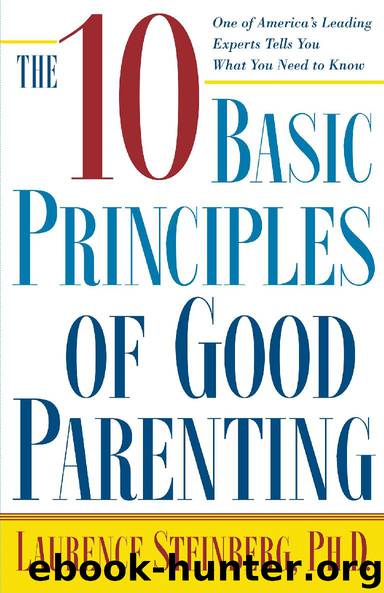The Ten Basic Principles of Good Parenting by Laurence Steinberg

Author:Laurence Steinberg
Language: eng
Format: epub
Publisher: Simon & Schuster
Published: 2017-03-28T00:00:00+00:00
Relaxing Limits as Your Child Matures
ONE KEY TO EFFECTIVE PARENTING is relinquishing control over your child’s behavior gradually over time, as she becomes more capable of managing her own life. There should never be a point in your child’s development when you don’t impose some limits and structure. But the rules you make and the limits you set should change as your child gets older.
Some parents become stricter as their child gets older because they worry that the stakes are getting more serious. In their view, it’s one thing to err on the side of permissiveness when your child is barely out of diapers, but it’s quite another to make this mistake when your child is old enough to get into trouble. To these parents, once a child has reached a certain age, you can’t ever be too strict.
Some parents take the completely opposite tack. As their child matures, they pretty much throw up their hands and chuck their rules and limits out the window. They figure it’s a lot easier to do this than to be locked in a nonstop power struggle with a child who wants more freedom. To these parents, once a child has reached a certain age, there’s nothing much that parents can do in the way of discipline that will make a difference. Why risk the family’s happiness over a losing cause?
Still other parents try not to change at all. They believe that they’ve developed a winning strategy and that there isn’t any reason to modify it as their child moves from one stage to the next. In their view, what worked earlier in childhood should work later as well. After all, they reason, if their parenting isn’t “broken,” there’s no need to fix it.
None of these three approaches is likely to work very well. If anything, they will backfire.
If you become more strict as your child develops, your child is going to rebel, because it’s only natural that he will expect to be granted more independence, not less, as he grows up. If you drop all of your rules and expectations, your child may end up running with a wild crowd and experimenting with risky and dangerous behavior, because most preadolescents and teenagers are inclined to take risks unless adults rein them in. And if you simply refuse to change your rules, you will most likely be mired in nonstop bickering with your child, because she will feel as if you haven’t acknowledged her growing up. Squabbling with you over every little thing is how she’s going to show you that she’s older than you think.
The right thing to do as your child develops is to very, very gradually ease up on your restrictions, but only as he demonstrates more responsibility. Changing the rules and restrictions you have in place is like driving on an icy road: You should avoid accelerating, putting on the brakes, or changing directions abruptly. The key is doing this one small step at a time and linking changes in your rules to changes in his ability to manage himself.
Download
This site does not store any files on its server. We only index and link to content provided by other sites. Please contact the content providers to delete copyright contents if any and email us, we'll remove relevant links or contents immediately.
Rewire Your Anxious Brain by Catherine M. Pittman(17619)
Talking to Strangers by Malcolm Gladwell(11950)
The Art of Thinking Clearly by Rolf Dobelli(8896)
Mindhunter: Inside the FBI's Elite Serial Crime Unit by John E. Douglas & Mark Olshaker(7873)
Becoming Supernatural by Dr. Joe Dispenza(7141)
Change Your Questions, Change Your Life by Marilee Adams(6684)
The Road Less Traveled by M. Scott Peck(6670)
Nudge - Improving Decisions about Health, Wealth, and Happiness by Thaler Sunstein(6666)
The Lost Art of Listening by Michael P. Nichols(6510)
Enlightenment Now: The Case for Reason, Science, Humanism, and Progress by Steven Pinker(6434)
Win Bigly by Scott Adams(6341)
Mastermind: How to Think Like Sherlock Holmes by Maria Konnikova(6275)
The Way of Zen by Alan W. Watts(5828)
Daring Greatly by Brene Brown(5679)
Big Magic: Creative Living Beyond Fear by Elizabeth Gilbert(4762)
Grit by Angela Duckworth(4760)
Men In Love by Nancy Friday(4365)
Flow by Mihaly Csikszentmihalyi(4078)
The Four Tendencies by Gretchen Rubin(4042)
